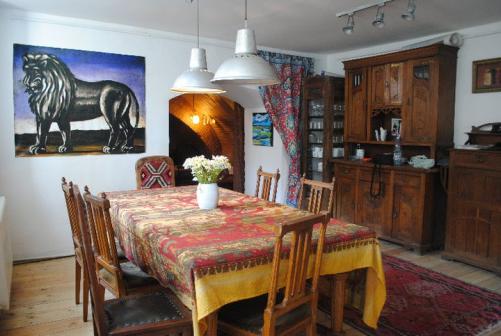 |
| The Georgian-born billionaire Bidzina Ivanishvili. Photo David Mdzinarishvili/Reuters |
(latitude.blogs.nytimes.com) TBILISI, Georgia – On Sunday afternoon, Nika Tavadze led me backstage at the Marjanishvili Theater and into a small dressing room plastered with photographs, programs and curling posters of old plays.
Many Georgians would recognize Tavadze from his two decades playing leading roles on Georgia’s stages, and for his chiseled good looks — a friend described him as “the Brad Pitt of Georgia”— but I hadn’t come to ask about that. I wanted to know how he had found himself playing a bit part in the heated piece of political theater that’s been sweeping Georgia for the past six months.
Here’s the plot. Along with thousands of other actors, directors, artists, teachers and poets in this poor, South Caucasus nation, Tavadze’s meager salary has been quietly subsidized for the past 15 years by a once-reclusive Georgian-born billionaire, Bidzina Ivanishvili, who made a fortune in banking and investments after the fall of the Soviet Union. He is worth an estimated $6.4 billion.
Francois Lenoir/Reuters President Mikheil Saakashvili of Georgia. “He was like a phantom,” Tavadze told me. “We would all receive his money, but no one ever saw his face.”
All that changed six months ago when Ivanishvili announced he would enter politics as an opposition leader, becoming, overnight, the most credible threat to President Mikheil Saakashvili since his rise to power during the peaceful Rose Revolution in 2003. Saakashvili has long been a darling of the West for his promises to remake Georgia as a beacon of democracy in its rough neighborhood.
In October, Ivanishvili accused Saakashvili of faking his democratic aspirations and amassing a “total monopoly of power.” Ivanishvili assembled an opposition coalition, Georgian Dream, to take on the ruling party during this year’s parliamentary elections, scheduled for October. He also promised to defeat Saakashvili himself should the president run in next year’s race for prime minister.
And with that began a six-month mud-slinging, with both men claiming to be the savior of the country’s rickety democracy. Debate often veered toward the subject of Ivanishvili’s alleged “vote buying” through his vast network of patronage — hence Tavadze’s walk-on role in the theater of national politics.
Almost immediately after Ivanishvili entered the fray, Saakashvili and his party loyalists began behaving like goons. (A United Nations rapporteur put it a little more diplomatically: The Georgian government’s “generally positive trajectory” is in danger, he wrote in February, of succumbing to “a widespread climate of fear, intimidation and arbitrary restrictions of fundamental freedoms.”) In October, Ivanishvili was stripped of his Georgian citizenship on the basis of an infrequently-applied law (he’s currently appealing), and in the following months, his businesses and colleagues were subjected to police harassment, surveillance and arrest on trumped up charges, according to Irakli Alasani, Georgia’s former ambassador to the United Nations and now a prominent member of Ivanishvili’s Georgian Dream coalition.
Last month, the ominously-titled Chamber of Control, Georgia’s internal auditing agency, hauled in more than 100 Ivanishvili supporters, subjecting each to private interrogations lasting for several hours. Amnesty International called it a case of voter intimidation.
It’s easy to see why Saakashvili and his cronies would see Ivanishvili, whose wealth is roughly half of Georgia’s G.D.P., as an enormous threat. Over the past decade and a half, Ivanishvili has been dispensing gifts not only to cultural elites like Tavadze, but to the needy, too, paying for health care for poor children and subsidizing the meager pensions of the elderly and disabled. In his hometown of Chorvila, everyone got a brand new roof. He’s also contributed an estimated $600 million to a variety of government projects, one of Ivanishvili’s aides told me, helping to build everything from military barracks to schools.
In Georgia, where a significant portion of the population lives below the poverty line and the unemployment rate hovers at 16 percent, funding like that is not incidental, and it’s completely reasonable for the government to pass electoral reforms limiting corporate donations and strictly auditing campaign funding.
But the way Saakashvili’s government has gone about it — namely, passing two problematic amendments in December, and unleashing the Chamber of Control in March — has been duplicitous, undemocratic and downright disheartening, particularly for the international community, which has sunk more than $4 billion dollars into Georgia since 2008 on the hope that it would actually become that beacon of democracy that Saakashvili promised.
To take the broad view on Georgia’s future, it doesn’t much matter who wins the parliamentary horserace this year. What matters is that Georgia’s fragile democracy survives its first gloves-off electoral competition. It has been easy for Saakashvili to espouse the value of democracy when he has not faced a credible competitor. Now that he is up against a titan, he must live up to his democratic promises.
At the very least, in the coming months, Georgia’s increasingly heated political theater must be allowed to play out under the harsh scrutiny of a national and international spotlight.
Haley Sweetland Edwards is a freelance writer living in Tbilisi, Georgia.


































